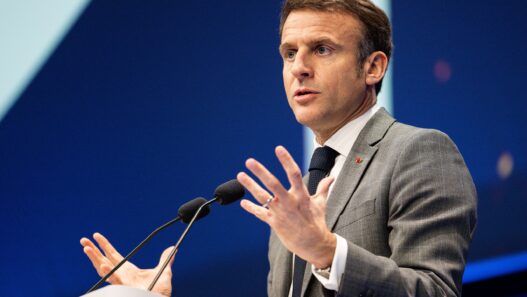Europe has always faced a growing challenge in balancing its trade policies between fostering competition and protecting domestic industries. This tension has recently been exemplified by the debate over tariffs on Chinese electric vehicles (EVs). As the European Union contemplates imposing tariffs on Chinese EVs, a significant rift has emerged between two of its most powerful member states: France and Germany. France, under President Emmanuel Macron, advocates for robust protective measures, whereas Germany, led by Chancellor Olaf Scholz, expresses caution regarding such protectionist policies, particularly in the context of its economically significant automobile sector. This divide reflects broader differences in the two nations’ economic strategies and their responses to global shifts in trade and competition.
Protectionism in Europe is not a new phenomenon. Historically, the EU has implemented trade barriers to safeguard its internal market from perceived unfair competition. This approach has been shaped by concerns over job losses, economic dependency, and national security, particularly in industries deemed essential to economic sovereignty. With the rise of globalization, however, Europe’s stance on protectionism has become increasingly nuanced, balancing openness to international markets with efforts to shield domestic industries from external threats. The debate over tariffs on Chinese EVs is a contemporary manifestation of this tension, with France and Germany at opposite ends of the spectrum.
The French Position: Proactive Protectionism
France has been a vocal advocate for European protectionism, particularly under Macron’s leadership. The French government has emphasized the need to protect European industries from external competitors, especially those benefiting from state subsidies, as is the case with Chinese EV manufacturers. According to Caulcutt and Leali (2024), Macron has positioned France as a champion of a more interventionist industrial policy, calling for “a stronger Europe” capable of defending its strategic sectors from global threats. For France, the imposition of tariffs on Chinese EVs is seen not only as an economic necessity but also as a political imperative to preserve European autonomy.
Macron’s stance is rooted in a broader vision of European sovereignty, where the EU must assert its economic independence in the face of rising competition from China and the United States. Caulcutt and Leali (2024) further argue that Macron views Chinese EVs as a direct threat to the European automobile industry, particularly as Chinese manufacturers have been able to produce EVs at lower costs, largely due to state subsidies. For France, tariffs are a necessary countermeasure to level the playing field and ensure that European companies can compete fairly in their own market.
The German Position: Economic Pragmatism
Germany, in contrast, has adopted a more cautious approach to the issue of tariffs on Chinese EVs. The German automotive sector, which is highly integrated into global supply chains, is particularly sensitive to changes in trade policy. German car manufacturers have invested heavily in China, both in terms of production and sales, and any escalation in trade barriers could have significant repercussions for their operations. As Grostern (2024) notes, Germany’s opposition to the proposed tariffs reflects its broader economic interests, with Chancellor Scholz warning that protectionist measures could lead to retaliatory actions from China, thereby harming German exports.
Germany’s reluctance to support tariffs is also tied to its historical commitment to free trade. Since the post-war period, Germany has been one of the leading proponents of open markets, a stance that has served it well as an export-driven economy. Rinke (2024) points out that Germany’s opposition to the EU Commission’s tariff plan stems from fears that such measures could backfire, leading to a trade war with China that would disproportionately affect German businesses. In this sense, Germany’s stance on Chinese EV tariffs is emblematic of its broader approach to European protectionism—one that prioritizes economic pragmatism over political assertiveness.
The Broader Implications for European Unity
The divergence between France and Germany on the issue of Chinese EV tariffs highlights a broader rift in their respective economic strategies. While France sees protectionism as a necessary tool for preserving European industries, Germany views it as a potential threat to the continent’s economic stability. This divide has significant implications for the future of European unity, particularly as the EU grapples with how to respond to external challenges such as Chinese state capitalism.
According to Rinke (2024), the German government’s resistance to tariffs on Chinese EVs could undermine the EU’s ability to present a unified front in trade negotiations. The EU Commission, which has been pushing for the tariffs, risks being caught in a political tug-of-war between its two largest member states, with France pushing for greater protectionism and Germany advocating for restraint. This internal discord could weaken the EU’s position in international trade discussions, particularly as it seeks to counterbalance the growing influence of China and the United States in global markets.
The Franco-German Rift: Macron’s Urgency Versus Scholz’s Caution
The divergence between France and Germany on the issue of tariffs on Chinese electric vehicles extends beyond mere economic policy—it underscores a profound ideological and strategic rift between President Emmanuel Macron and Chancellor Olaf Scholz. Macron has adopted a sense of urgency in his rhetoric, warning that the European Union faces existential threats if it does not take decisive action to protect its industries. In a particularly stark statement, Macron asserted that the EU “could die” if it fails to respond effectively to the pressures of global competition, particularly from China and the United States (Caulcutt & Leali, 2024). For Macron, this isn’t just about tariffs; it is about the survival of Europe as a geopolitical actor capable of defending its own economic interests. He views the imposition of tariffs on Chinese electric vehicles as a necessary measure to protect European companies from being undercut by Chinese state-subsidized industries, which are able to flood the market with cheaper products, threatening the viability of European manufacturers.
Macron’s statements reveal a broader vision for Europe’s role in the global economy. He has long advocated for what he calls European sovereignty—an effort to ensure that Europe can stand on its own without undue reliance on external powers, particularly in strategic sectors like energy, technology, and manufacturing. His fear that the EU “could die” reflects his belief that Europe risks becoming economically and politically irrelevant unless it takes bold steps to assert its autonomy. For Macron, tariffs are not simply a protectionist measure; they are a tool to shield Europe from what he sees as unfair global competition and to bolster its internal market.
In stark contrast, Scholz has adopted a more cautious, economically pragmatic stance. He acknowledges the concerns about unfair competition but argues that any protective measures, such as tariffs, must be carefully calibrated to avoid unintended consequences. Scholz warned that imposing tariffs on Chinese electric vehicles “must not lead to us harming ourselves” (Rinke, 2024). This statement reflects his deep concern that Europe, and particularly Germany, could face retaliation from China if it adopts protectionist policies, potentially endangering the significant economic ties between the two countries. Germany, as Europe’s largest economy and a global export powerhouse, is particularly sensitive to any disruptions in trade. China is one of Germany’s key trading partners, and the German automotive industry is highly dependent on both Chinese markets and supply chains. Scholz’s warning underscores his belief that punitive tariffs could trigger a tit-for-tat trade war, which would disproportionately hurt German exporters, including its automakers, many of which have heavily invested in China.
The rift between Macron and Scholz is thus not merely one of differing national interests but also of competing visions for the future of Europe. Macron’s approach is rooted in a more interventionist economic philosophy, where the state and supranational institutions like the EU play a central role in protecting industries deemed vital to European sovereignty. His rhetoric appeals to a vision of Europe as a fortress that must be defended from external economic forces, particularly those that he believes operate under unfair conditions, such as China’s state-backed industries. This aligns with France’s historical tendency toward economic interventionism and protectionism, particularly in sectors it deems strategic, such as energy, agriculture, and now, green technologies like electric vehicles.
In contrast, Scholz’s caution stems from Germany’s long-standing commitment to free trade and its reliance on open global markets. Scholz’s resistance to protectionism reflects Germany’s broader economic model, which is export-driven and deeply integrated into global supply chains. While Scholz does not dismiss the need for action against unfair competition, he is far more wary of adopting measures that could provoke retaliation and disrupt Germany’s critical trade relationships. Scholz’s fear of “harming ourselves” reveals the economic calculations behind Germany’s stance—while protective measures might shield certain European industries in the short term, they could also jeopardize the broader economic stability of the EU, particularly for export-heavy economies like Germany.
This clash between Macron and Scholz illustrates a deeper philosophical divide within the EU about how to handle the challenges posed by globalization and state-backed competition from countries like China. Macron’s call for a strong, interventionist Europe is driven by a desire to protect European industries and assert European autonomy, while Scholz’s more cautious, trade-oriented approach is driven by economic pragmatism and a desire to preserve Germany’s global competitiveness. This rift has significant implications not only for the specific issue of Chinese EV tariffs but for the future of European economic policy as a whole. If France and Germany, the two economic powerhouses of the EU, cannot reconcile their differences, it could lead to a fragmentation of European unity on trade policy and weaken the EU’s ability to act cohesively on the global stage.












